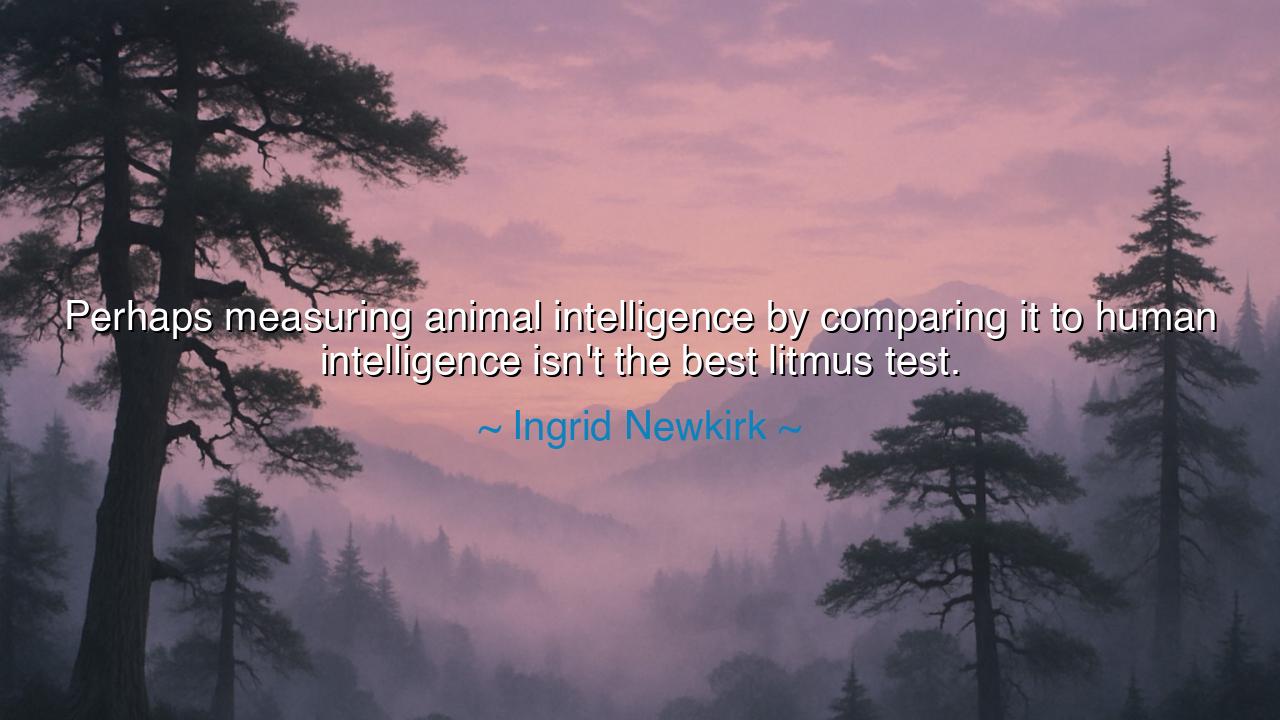
Perhaps measuring animal intelligence by comparing it to human
Perhaps measuring animal intelligence by comparing it to human intelligence isn't the best litmus test.






In the compassionate and piercing words of Ingrid Newkirk, founder of the animal rights movement PETA, we encounter a truth that challenges the very foundations of human arrogance: “Perhaps measuring animal intelligence by comparing it to human intelligence isn’t the best litmus test.” This is not merely a statement about animals — it is a mirror held up to humanity itself. It calls us to humility, to wisdom, to the recognition that intelligence is not one singular flame, but a vast constellation of lights, each shining in its own way.
The origin of this quote lies in Newkirk’s lifelong advocacy for the dignity and worth of all living beings. A fierce voice for those who cannot speak, she has spent decades confronting humanity’s tendency to judge the value of life through its own narrow lens. When she questions the “litmus test” of human intelligence, she asks us to look beyond the measure of logic, speech, and invention — the qualities we prize most in ourselves — and to see intelligence in all its natural forms: in instinct, in empathy, in survival, in harmony with the earth. For what is the worth of a mind that can split atoms if it cannot also honor life?
To compare all intelligence to that of man is to misunderstand both the animal and ourselves. The raven, who hides food and remembers its place for months, shows a mind shaped by survival and strategy. The elephant, who mourns its dead and comforts its young, reveals an intelligence born of emotion and memory. The dolphin, who recognizes itself in a mirror and communicates with patterns of clicks and whistles, speaks of awareness as vast as the ocean it inhabits. Are these forms of intelligence lesser — or simply different? Newkirk’s words remind us that intelligence is not hierarchy, but harmony, and that the attempt to rank the minds of creation is a folly born of pride.
History, too, bears witness to our slow awakening to this truth. For centuries, man saw himself as the sole bearer of reason, the crown of creation. But as the world’s understanding deepened, that crown grew heavy with doubt. In the 20th century, Jane Goodall entered the forests of Gombe and saw chimpanzees fashioning tools to fish for termites — an act once thought unique to humans. When she reported her findings, the scientific world was shaken. The definition of “human” intelligence had to be rewritten. In that moment, the line between “us” and “them” began to fade, revealing what Newkirk now proclaims: that intelligence is not the monopoly of man, but the shared inheritance of life.
Newkirk’s insight reaches beyond science — it touches upon ethics. For when we claim to be superior, we grant ourselves permission to dominate. The measure we use to judge becomes the weapon we wield. We kill not from hunger, but from the illusion that lesser minds deserve lesser fates. Yet the wise among the ancients knew another truth. The philosopher Pythagoras taught that all beings possess souls, that the cow, the bird, the fish each move with the spark of the divine. To harm them without cause was not only cruelty — it was ignorance of the great unity of existence. Newkirk’s words echo that ancient wisdom, reminding us that the moral worth of a being lies not in how it thinks like us, but in how it feels, lives, and loves in its own nature.
To understand her message is to see intelligence not as a ladder but as a circle, each life a unique expression of the universal mind. The bee that navigates miles to find its hive, the whale that sings across oceans, the dog that senses its master’s sorrow — these are not lesser minds, but other minds. Their genius lies not in speech or invention, but in instinct and attunement. And perhaps, in their quiet ways, they have mastered something we have forgotten: how to live in balance, not domination; in connection, not conquest.
Therefore, O listener and seeker of wisdom, take this teaching into your heart: respect all forms of life, not because they resemble you, but because they complete you. Step lightly upon the earth, for every creature you meet bears a fragment of the same intelligence that burns within your soul. Observe the animals not as subjects to study, but as teachers to learn from — their patience, their awareness, their grace. Let your measure of intelligence be not how well one reasons, but how deeply one lives in harmony with the world.
And remember always the spirit of Newkirk’s truth: to measure others by ourselves is to see with blindness, but to honor their difference is to see with the eyes of wisdom. In that seeing lies the beginning of compassion — and in compassion, the true intelligence of the heart.






AAdministratorAdministrator
Welcome, honored guests. Please leave a comment, we will respond soon